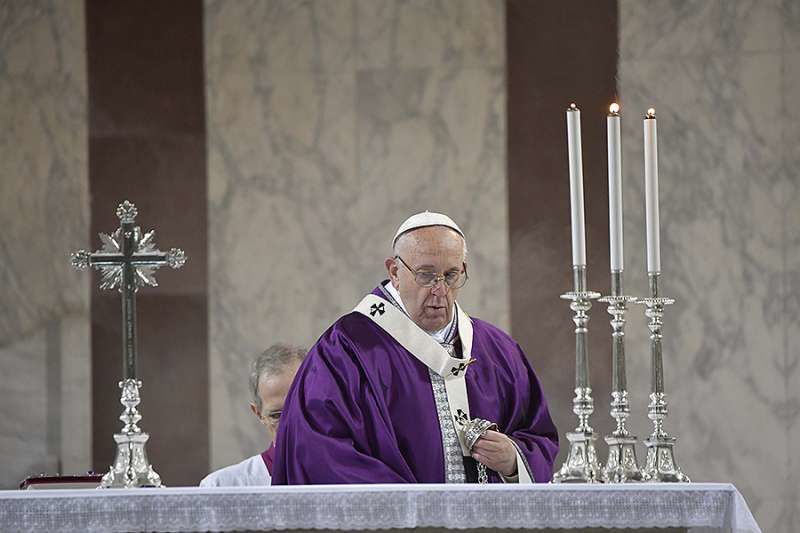At Mass for Ash Wednesday, Pope Francis invited everyone to live the 40 days of Lent as a time to “pause” from things which keep us from virtue and to return home to the loving and merciful embrace of God the Father.
“Return without fear to those outstretched, eager arms of your Father, who is rich in mercy, who awaits you. Return without fear, for this is the favorable time to come home,” the Pope said Feb. 14.
“[Lent] is the time for allowing one’s heart to be touched...” he continued, explaining how “persisting on the path of evil only gives rise to disappointment and sadness. True life is something quite distinct and our heart indeed knows this. God does not tire, nor will he tire, of holding out his hand.”
Marking the start of the Lenten season Feb. 14, Pope Francis prayed the Stations of the Cross at St. Anselm Church in Rome before processing the short way to the Basilica of Santa Sabina for the celebration of Mass, benediction, and the imposition of ashes.
The traditional procession is composed of cardinals, bishops, priests, the Benedictine monks of St. Anselm, the Dominican friars of Santa Sabina, and lay people. As they make their way between the two churches, they sing the Litany of the Saints.
The practice of beginning the Lenten season of prayer and penance this way was started by Pope John XXIII when he came for the opening of the Pontifical Liturgical Institute in 1961.
In his homily at Mass, Pope Francis criticized distrust, apathy and resignation, stressing that Lent is the ideal time to uproot these and other temptations from our hearts. He listed out different ways we can do this through the actions of pausing, seeing, and returning to the Father.
He offered several suggestions of how to pause, including refraining from showing off, or from an attitude which gives rise to unproductive thoughts and self-pity, and which lead us to forget our call to encounter others and share in their burdens.
He also urged an end to the desire “to control everything, know everything, destroy everything,” which he said stems from a lack of gratitude for our life and what we've already been given.
Lent is also a good time for the “creative power of silence” in order to “leave behind the unrest and commotion that fill the soul with bitter feelings which never get us anywhere,” he advised.
“Pause from this compulsion to a fast-paced life that scatters, divides and ultimately destroys time with family, with friends, with children, with grandparents, and time as a gift... time with God,” he stated.
The Pope also called out “haughty looks” and “fleeting and pejorative comments,” and urged a break from words stemming from a lack of “tenderness, compassion and reverence for the encounter with others, particularly those who are vulnerable, hurt and even immersed in sin and error.”
Francis urged people instead to look upon and contemplate those actions which promote faith, hope and charity, and to look upon the faces of the vulnerable and in need, like families who, despite hardship, still strive to make their homes “a school of love.”
He also advised people to see the faces of children and youth, yearning for a future, to see the faces of the elderly reflecting “God's wisdom at work,” and to see the faces of sick people and their caretakers, whose vulnerability reminds us of the value of every person.
“See the remorseful faces of so many who try to repair their errors and mistakes,” he continued, “and who from their misfortune and suffering fight to transform their situations and move forward.”
Finally, the Pope encouraged everyone to take time during Lent to “see and contemplate the face of Crucified Love.”
“See and contemplate the real face of Christ crucified out of love for everyone, without exception,” he said. “For everyone? Yes, for everyone. To see his face is an invitation filled with hope for this Lenten time, in order to defeat the demons of distrust, apathy and resignation.”
Interested in more? Subscribe to Angelus News to get daily articles sent to your inbox.

